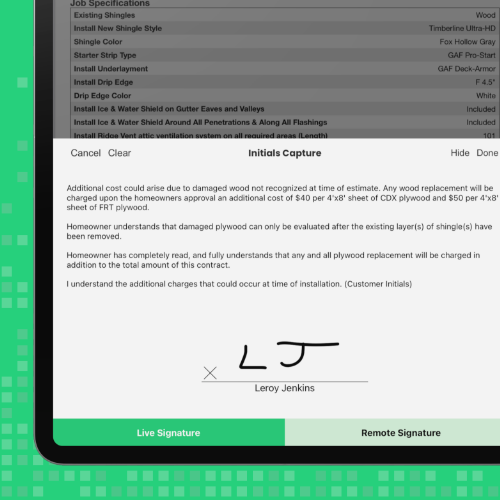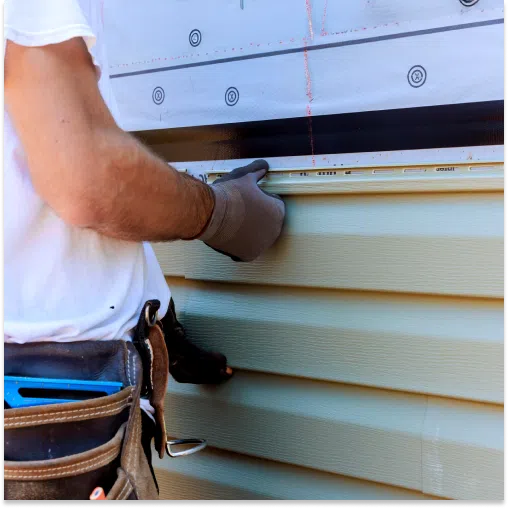Each home improvement contract agreement is a vital step in the sales process for contractors. However, it’s common for businesses to have incomplete contracts that are missing key elements. This can cause a disconnect with homeowners, lead to problems with each job, and cost your company money in the long run. Let’s look at the different types of contracts to consider for your business and the best way to present them to homeowners.

Most Popular Home Improvement Contract Agreement
The type of contracts you prepare will go hand-in-hand with the services you provide. For instance, the specific details will be different for roofing jobs, windows and doors replacement, remodels, and everything in-between. Yet, the first step is determining the type of contract you are offering.
For example, the most common home improvement contract agreements include:
Two contracts in this list stand out above the rest. That’s the fixed price contract and the time and materials contract. Both are widely considered the most popular contracts in use by residential contractors today. Let’s dig a bit deeper into these two contracts below.
Fixed Price Contracts
Fixed price contracts are also known as lump sum contracts. In this case, the contract clearly states an agreed upon fixed cost. The final price is determined before the work begins. They’re best suited for projects in which the scope of the work can be clearly determined, such as the cost of materials and the labor needed.
For homeowners, this is the best home improvement contract agreement as it prevents additional fees and worry. The homeowner will know exactly what they are paying, no matter the timeline or other issues that are out of their control.
In the rare case that changes must be made, the contractor will be required to come to an agreement with the homeowner over additional costs. This is known as a change order, but you must come to a formal agreement to move forward.
Fixed price contracts protect the homeowner and their pockets. But it also protects the business and ensures the contractor works within the budget.
Time and Materials Contracts
While fixed price is the most frequently used contract, time and materials is another popular home improvement contract agreement. A time and materials contract specifies the purpose of the job and how the contractor will be paid based on hourly labor rates and materials cost.
These are best suited for jobs that are less predictable, such as remodels and renovations. It creates more flexibility for the contractor and is usually based on an initial estimate. Although, the estimate may not be the full price required to complete the job. Adjustments are easier to make as specifications change or additional resources are needed.
To protect the homeowner and your business, it’s important to place clauses within a time and materials contract. This includes maximum labor hours, materials markups, and payment milestones as the work progresses.
Presenting Contracts to Homeowners
Home improvement services are necessary to ensure a home’s long-term value and integrity. Homeowners know this, but in the digital age, they also understand the costs of these projects and other options available to them. That’s why it’s so important to present a home improvement contract agreement in a professional manner.
According to Grand View Research, the home improvement market is expected to surpass the $1 trillion mark by 2027. The demand is growing, and homeowners are more knowledgeable than ever before.
You want to build trust with homeowners and not waste anyone’s time. And with the economy in a downturn, homeowners are more protective over the money in their pockets. That’s why you must streamline your sales process to become more organized and effective at the kitchen table.
As the industry moves forward, many businesses are turning to contractor software to optimize sales and close more jobs. In fact, sales automation gives you complete control over the sales journey from the initial contact with a potential customer to the inspection, estimate, contract, and job completion.
Better yet, sales software makes it much easier to train and retain your best sales reps. You can plug them directly into the software and they’re ready to go.
Now your reps can focus on selling the job instead of searching through paper materials and struggling to price a job correctly. Every second counts when working with potential customers, and sales automation makes everything more efficient. You can track the entire process and access all customer data in one place. This helps you analyze your sales and make adjustments to improve closing rates and drive higher margins.
Lastly, going digital with your sales makes producing contracts easier than ever before. All documents are organized within the software, and you can generate a new contract in no time. Required fields ensure your reps don’t skip any key elements to the contract and you can auto-populate any imaging for the job.
With digital signatures and validation fields, customers can easily sign and initial next to important contract information that you require for a job. This protects your business, and the presentation really resonates with homeowners. It saves everyone time and prevents common paper errors that lead many homeowners to reach out to competitors.
Produce More Professional Contracts with New Technology
Leap sales software can help you build upon your sales strategy and help you get the absolute most out of your operations. From your office staff to your field reps, everyone’s workflow and communication will greatly improve. Furthermore, all your contracts and customer information is organized and accessible in the application. You’re one click away from accessing projects of the past, present, and future that can give you better insights into your sales.
Leap also partners with industry leaders within the home improvement sector to provide further value that complements our software. This includes measurement tools, 3D mapping, aerial imaging, financing, manufacturing, and customer relationship management.
Leap’s point-of-sale software is a contractor tool that is built to help you become more efficient and effective as a whole. You can scale your business, retain great employees, and make adjustments that will keep you ahead of the competition in your area.
To learn more about Leap, fill out the form below and schedule a 15-minute demo with one of our software experts. The first step to providing a home improvement contract agreement is maximizing the potential of your sales operation.




